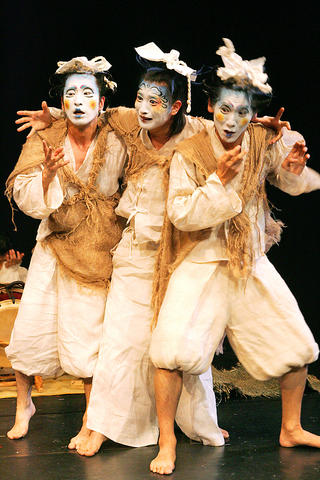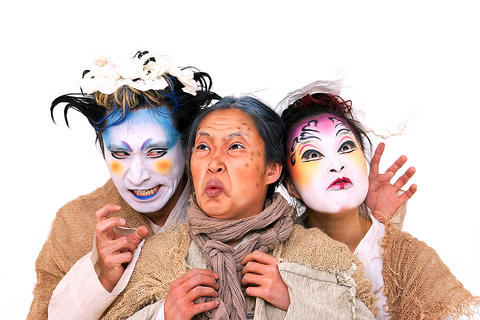When the star-crossed lovers of Shakespeare's A Midsummer Night's Dream are named Hang (Lysander), Byuk (Hermia), Ik (Helena), Ru (Demerits), Kabi (Titania) and Dot (Oberon), it's clear that this well-worn favorite has morphed into something else all together.
Though South Korea's Yohangza Theater Company has comprehensively reworked the original to create something almost unrecognizable, its production retains the original's impish spirit, which made it the toast of this year's Edinburgh Festival Fringe and one of the few foreign productions of Shakespeare to make it into the hallowed halls of London's Barbican Theater.
For all its success, it's hard to understand what relationship Yohangza's production has to do with Shakespeare's play at all, other than its title and some basic plot elements. Homing in on universal themes of lovers at cross-purposes and mischievous spirits let loose, Jung Ung-yang, the director and founder of the company, has condensed the comedy so that it involves just the six main characters along with comic roles of Puck and Bottom. The story is driven by physical theater and percussion music, which allows the production to cross language boundaries easily; the poetry of language is firmly relegated to second place. This is hardly a new development as Shakespeare has been dragooned into all kinds of unlikely mediums. Yohangza's version is yet another instance of the ubiquitous fusion of East and West.

PHOTO: COURTESY OF ARTS FESTIVAL
Yohangza's A Midsummer Night's Dream is lively, with plenty of folk elements that are well suited to the "pastoral" aspect of the original material, and the energy and comic mastery of the performers carry the show.
If you're looking for new insights into this much-loved play, you will be sadly disappointed. For that matter, A Midsummer Night's Dream also fails to open any windows on Korean culture, seeing as this play settles for making a few superficial twists to a well-known story.
As part of the 7th Taipei Arts Festival, A Midsummer Night's Dream fulfills its function of providing a new perspective on the world, but, above all else, it provides a warning as to the dangers of half-baked fusions, a warning that Taiwan's artistic community could only benefit from.


On April 26, The Lancet published a letter from two doctors at Taichung-based China Medical University Hospital (CMUH) warning that “Taiwan’s Health Care System is on the Brink of Collapse.” The authors said that “Years of policy inaction and mismanagement of resources have led to the National Health Insurance system operating under unsustainable conditions.” The pushback was immediate. Errors in the paper were quickly identified and publicized, to discredit the authors (the hospital apologized). CNA reported that CMUH said the letter described Taiwan in 2021 as having 62 nurses per 10,000 people, when the correct number was 78 nurses per 10,000

As Donald Trump’s executive order in March led to the shuttering of Voice of America (VOA) — the global broadcaster whose roots date back to the fight against Nazi propaganda — he quickly attracted support from figures not used to aligning themselves with any US administration. Trump had ordered the US Agency for Global Media, the federal agency that funds VOA and other groups promoting independent journalism overseas, to be “eliminated to the maximum extent consistent with applicable law.” The decision suddenly halted programming in 49 languages to more than 425 million people. In Moscow, Margarita Simonyan, the hardline editor-in-chief of the

Six weeks before I embarked on a research mission in Kyoto, I was sitting alone at a bar counter in Melbourne. Next to me, a woman was bragging loudly to a friend: She, too, was heading to Kyoto, I quickly discerned. Except her trip was in four months. And she’d just pulled an all-nighter booking restaurant reservations. As I snooped on the conversation, I broke out in a sweat, panicking because I’d yet to secure a single table. Then I remembered: Eating well in Japan is absolutely not something to lose sleep over. It’s true that the best-known institutions book up faster

Though the total area of Penghu isn’t that large, exploring all of it — including its numerous outlying islands — could easily take a couple of weeks. The most remote township accessible by road from Magong City (馬公市) is Siyu (西嶼鄉), and this place alone deserves at least two days to fully appreciate. Whether it’s beaches, architecture, museums, snacks, sunrises or sunsets that attract you, Siyu has something for everyone. Though only 5km from Magong by sea, no ferry service currently exists and it must be reached by a long circuitous route around the main island of Penghu, with the